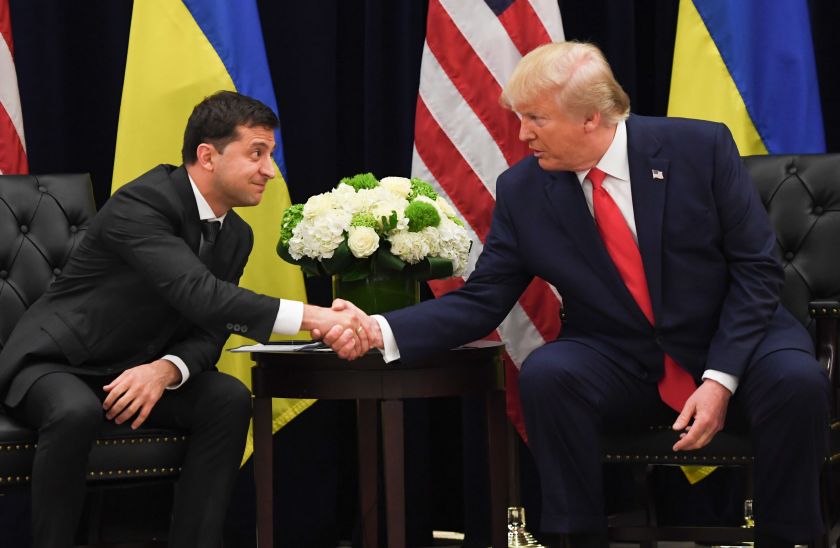It’s Corruption of the Most Obvious Kind, and Ukrainians Have a Word for It
When Donald Trump asked his Ukrainian counterpart to announce investigation of a U.S. political rival, it wasn’t just dirt he was trying to import, but a whole phenomenon.
It’s name in Ukraine can be roughly translated as “problem-solving.” A whole class of people provide that service. The local name for them is “reshala.”
For example, if your business is being attacked by the government’s security service for no apparent reason, someone will offer you a solution, for a certain fee, of course. In America, that’s known as a protection racket.
You can count on problem-solvers if the police start a criminal case against you or if you sense that the judge will not take your side in court. There are political problem-solvers who make sure that any law or regulation that makes you a fortune will be approved. You can find someone who will “take care” of your opponent or their business—not for free, of course.
Trump’s tactics look very similar to this abominable phenomenon, which was ubiquitous in Ukraine and is now slowly retreating.
Trump’s tactics look very similar to this abominable phenomenon, which was ubiquitous in Ukraine and is now slowly retreating.
He asked his personal lawyer Rudy Giuliani to take care of a small problem for him. Giuliani, in turn, found Lev Parnas and Igor Fruman as operators on the ground. Both Parnas and Fruman were born in the U.S.S.R. and lived through the wild 1980s and 1990s in their native Ukraine and Belarus. There the problem-solving modus operandi was basically the economic equivalent of Darwin’s survival-of-the-fittest principle.
Several U.S. career diplomats who have testified in the impeachment hearings have said that Trump has described Ukraine as “corrupt.” It’s true, my country scores poorly on graft avoidance.
Reforming the System
But it’s equally true that Ukraine has a whole new generation of people who have spent a good part of the last decade trying to break the back of that crooked system and purge the dodgy players who have thrived because of it.
We have been an exemplary country in terms of opening public data online. We have designed a public procurement system that has become a case study in the world. Our public officials fill our ridiculously detailed income declarations and they are publicly accessible. Many services provided by the state are now moving online to remove cumbersome procedures and potential for any go-betweens to abuse the system.
Since our Revolution of Dignity in 2014, we have had several consecutive governments where key positions were taken by world-class financiers, managers and leaders from the non-profit sector. They have run a relay race to improve the country’s transparency and governance, and, consequently, people’s well-being.
We have created institutions for investigating and prosecuting corruption. We are trying very hard, despite the system’s resistance. Change has not happened overnight, but it is taking place in incremental steps.
The United States, however, seems to be going in the opposite direction under Trump. A mere perception of disloyalty to Trump can destroy a career of an exceptional professional, as former U.S. Ambassador Marie Yovanovitch can testify. The institution of the presidency and the State Department can be used to advance a personal goal. And impeachment procedure, designed as part of a system of political checks and balances, is slammed by Trump as a “kangaroo court” to name just a few of his insults.
Feeling Betrayed
The erosion of U.S. institutions doesn’t just affect America. There are real consequences for the rest of the world. In Ukraine, for example, many people feel betrayed by their strategic partner.
People feel they’re David and Russia is Goliath. For a while it looked liked David might not get a sling.
There is another fear in Ukraine of a longer-term effect. Both sides of the aisle in the United States are implicated in cases of alleged political corruption or other misdeeds in Ukraine. Many fear that the impeachment hearings may make the very word “Ukraine” toxic.
This would be a dramatic turn from the bipartisan support my country has enjoyed in the past, especially in our fight against Russia, which annexed Crimea and propped up an illegal occupation of parts of the eastern regions of Ukraine.
In his testimony at the impeachment hearings, acting Ambassador William B. Taylor Jr. made it very clear that the Ukrainians feared Trump was not just trying to withhold military support but could provide Russia’s Vladimir Putin yet another gift by walking away from Ukraine altogether.
We hope America can come back to its senses, start to fix its own system and help those countries who are trying to fight for honesty, liberty and hold back Russian aggression.
Katya Gorchinskaya is an award-winning Ukrainian journalist who has also written for The Guardian, The Wall Street Journal, the Financial Times, Politico, Al Jazeera and The Economist. She was CEO of Hromadske TV when journalists transformed its online predecessor into a TV and cable television channel that is now the biggest independent media operation in Ukraine.




